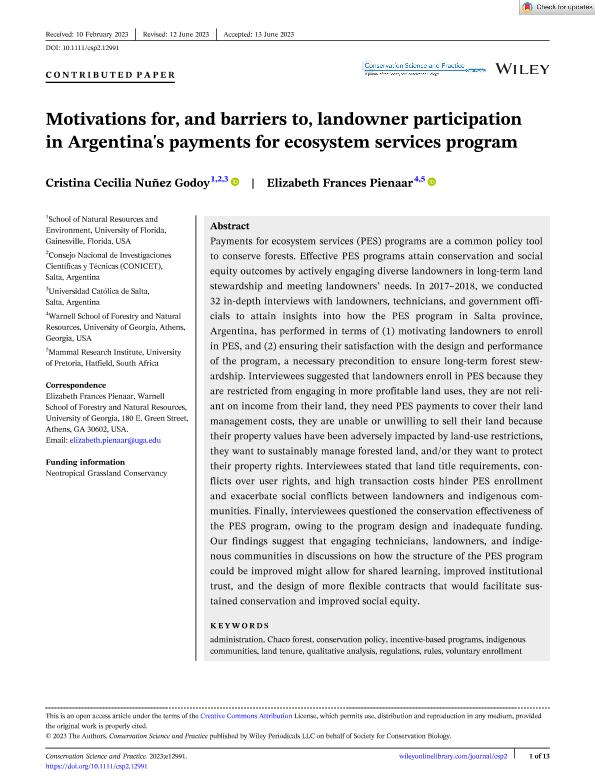Mostrar el registro sencillo del ítem
dc.contributor.author
Nuñez Godoy, Cristina Cecilia

dc.contributor.author
Frances Pienaar, Elizabeth
dc.date.available
2024-01-08T14:14:22Z
dc.date.issued
2023-07
dc.identifier.citation
Nuñez Godoy, Cristina Cecilia; Frances Pienaar, Elizabeth; Motivations for, and barriers to, landowner participation in Argentina's payments for ecosystem services program; John Wiley & Sons; Conservation Science and Practice; 5; 8; 7-2023; 1-13
dc.identifier.issn
2578-4854
dc.identifier.uri
http://hdl.handle.net/11336/222812
dc.description.abstract
Payments for ecosystem services (PES) programs are a common policy tool to conserve forests. Effective PES programs attain conservation and social equity outcomes by actively engaging diverse landowners in long-term land stewardship and meeting landowners’ needs. In 2017–2018, we conducted 32 in-depth interviews with landowners, technicians, and government officials to attain insights into how the PES program in Salta province, Argentina, has performed in terms of (1) motivating landowners to enroll in PES, and (2) ensuring their satisfaction with the design and performance of the program, a necessary precondition to ensure long-term forest stewardship. Interviewees suggested that landowners enroll in PES because they are restricted from engaging in more profitable land uses, they are not reliant on income from their land, they need PES payments to cover their land management costs, they are unable or unwilling to sell their land because their property values have been adversely impacted by land-use restrictions, they want to sustainably manage forested land, and/or they want to protect their property rights. Interviewees stated that land title requirements, conflicts over user rights, and high transaction costs hinder PES enrollment and exacerbate social conflicts between landowners and indigenous communities. Finally, interviewees questioned the conservation effectiveness of the PES program, owing to the program design and inadequate funding. Our findings suggest that engaging technicians, landowners, and indigenous communities in discussions on how the structure of the PES program could be improved might allow for shared learning, improved institutional trust, and the design of more flexible contracts that would facilitate sustained conservation and improved social equity.
dc.format
application/pdf
dc.language.iso
eng
dc.publisher
John Wiley & Sons

dc.rights
info:eu-repo/semantics/openAccess
dc.rights.uri
https://creativecommons.org/licenses/by/2.5/ar/
dc.subject
ADMINISTRATION
dc.subject
CHACO FOREST
dc.subject
CONSERVATION POLICY
dc.subject
INCENTIVE-BASED PROGRAMS
dc.subject
INDIGENOUS COMMUNITIES
dc.subject
LAND TENURE
dc.subject
QUALITATIVE ANALYSIS
dc.subject
REGULATIONS
dc.subject
RULES
dc.subject
VOLUNTARY ENROLLMENT
dc.subject.classification
Otras Ciencias de la Tierra y relacionadas con el Medio Ambiente

dc.subject.classification
Ciencias de la Tierra y relacionadas con el Medio Ambiente

dc.subject.classification
CIENCIAS NATURALES Y EXACTAS

dc.title
Motivations for, and barriers to, landowner participation in Argentina's payments for ecosystem services program
dc.type
info:eu-repo/semantics/article
dc.type
info:ar-repo/semantics/artículo
dc.type
info:eu-repo/semantics/publishedVersion
dc.date.updated
2024-01-05T11:46:08Z
dc.journal.volume
5
dc.journal.number
8
dc.journal.pagination
1-13
dc.journal.pais
Estados Unidos

dc.description.fil
Fil: Nuñez Godoy, Cristina Cecilia. Universidad Católica de Salta; Argentina. Consejo Nacional de Investigaciones Científicas y Técnicas; Argentina. University of Florida; Estados Unidos
dc.description.fil
Fil: Frances Pienaar, Elizabeth. University of Georgia; Estados Unidos
dc.journal.title
Conservation Science and Practice
dc.relation.alternativeid
info:eu-repo/semantics/altIdentifier/doi/http://dx.doi.org/10.1111/csp2.12991
Archivos asociados
